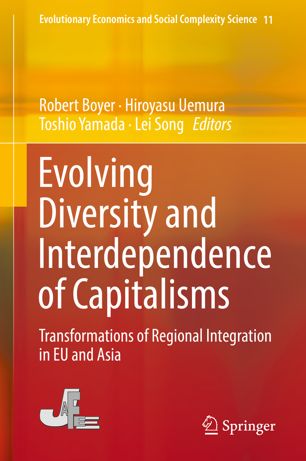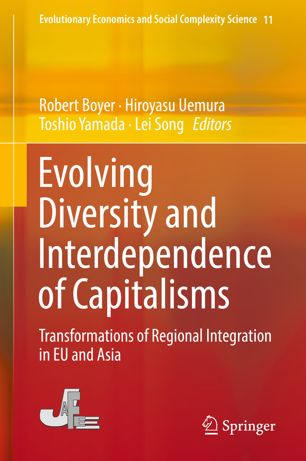VisioConférence : « Perspectives transaméricaines », Hydrocarbures non conventionnels dans les Amériques : une nouvelle donne énergétique face à la crise globale, Institut des Amériques / ENS, 12 janvier 2021
Participation au Blog d’Alternatives Economiques, le 8 janvier 2021.
 La pandémie, un accélérateur impitoyable de transformations du capitalisme, Xerfi Canal a reçu le 27 octobre 2020 Robert Boyer, économiste, pour parler de la transformation du capitalisme liée la pandémie. Une interview menée par Laurent Faibis
La pandémie, un accélérateur impitoyable de transformations du capitalisme, Xerfi Canal a reçu le 27 octobre 2020 Robert Boyer, économiste, pour parler de la transformation du capitalisme liée la pandémie. Une interview menée par Laurent Faibis
 Menaces sur la démocratie : économie, relations sociales, libertés publiques, Xerfi Canal a reçu le 17 novembre 2020, Robert Boyer, économiste, pour parler de la crise de la Covid-19. Une interview menée par Laurent Faibis.
Menaces sur la démocratie : économie, relations sociales, libertés publiques, Xerfi Canal a reçu le 17 novembre 2020, Robert Boyer, économiste, pour parler de la crise de la Covid-19. Une interview menée par Laurent Faibis.
La-transmutation-des-capitalismes-dans-la-crise, Xerfi Canal a reçu Robert Boyer, économiste, pour parler de l’intégration européenne. le 30 novembre 2020. Une interview menée par Laurent Faibis.
Cette fois-ci c’est bien l’Europe à quitte ou double Xerfi Canal a reçu Robert Boyer, économiste, pour parler de l’accélération de la transformation des capitalismes. le 10 décembre 2020. Une interview menée par Laurent Faibis.
 Comment sortir du sur-endettement ? les leçons de l’histoire, Xerfi Canal 15 décembre 2020, Robert Boyer, économiste, invité pour parler de la crise de la Covid-19. Une interview menée par Laurent Faibis.
Comment sortir du sur-endettement ? les leçons de l’histoire, Xerfi Canal 15 décembre 2020, Robert Boyer, économiste, invité pour parler de la crise de la Covid-19. Une interview menée par Laurent Faibis.
Editions la découverte, Paris, 1er Octobre 2020.
Annexes : Graphiques, figures et tableaux complémentaires à l’ouvrage, Présentation, Introduction, Chapitre 1, Chapitre 2, Chapitre 3, Chapitre 4, Chapitre 5, Chapitre 6, Chapitre 7, Chapitre 8, Chapitre 9, Conclusion.
Depuis le début de la crise mondiale de la covid-19, les questionnements sur l’avenir des capitalismes se sont multipliés. Et nombre de voix se sont élevées pour que les « jours d’après » ne soient plus jamais comme « ceux d’avant ». Dans le court terme, les pronostics étaient confrontés à une incertitude radicale, invitant à la prudence : il faudra du temps pour démêler l’écheveau des responsabilités et construire d’éventuelles alternatives.
D’où l’importance de comprendre les ressorts de la crise. Comme l’a montré le célèbre 18 Brumaire de Louis Bonaparte de Marx (1852), les meilleures analyses « à chaud » sont le fait d’auteurs ayant une vision de la dynamique du système sur un horizon long. C’est pourquoi Robert Boyer, contributeur majeur de l’École de la régulation – qui étudie l’économie comme partie intégrante de sociétés traversées par l’histoire –, est bien placé pour relever ce défi. Lors de crises précédentes, il a démontré la valeur explicative de cette approche, qui prend en compte à la fois les inerties tendant à la reproduction du système et les forces impulsant sa transformation : l’issue n’est pas écrite à l’avance et plus longtemps durent les crises, plus le retour à la situation antérieure devient improbable.
Dans cet essai, l’auteur donne à comprendre les processus déclenchés en 2020 et éclaire sur le champ des possibles. La dislocation des relations internationales, l’éclatement de la zone euro, la déstabilisation de l’État social, la montée des populismes ne sont pas improbables. Mais n’est pas non plus exclue une grande bifurcation vers un nouveau modèle construit sur la complémentarité entre éducation, formation, santé et culture, qui répondrait à la demande de solidarité des citoyens et aux exigences de la transition écologique.
Intervenants : Robert Boyer (Centre Cournot, Institut des Amériques), Xavier Ragot (OFCE), Les débats du Centre Cournot, en ligne, mars 2020.
in Boyer Robert, Toshio Yamada, and Lei Song (Eds), Evolving Diversity and Interdependence of Capitalisms. Transformations of Regional Integration in EU and Asia, book series (EESCS, volume 11), Springer, Japan KK, part of Springer Nature 2018, p. 259-302
Boyer Robert, Toshio Yamada, and Lei Song (Eds), Book, Part of the Evolutionary Economics and Social Complexity Science book series (EESCS, volume 11), Springer, Japan KK, part of Springer Nature 2018
Introduction
This book integrates three levels of political–economic analysis: first a comparative institutional analysis of the varieties of capitalism in both Europe and Asia, second a macroeconomic analysis of industrial structural change and economic dynamics of the national economies in Europe and Asia, and then an encompassing analysis of international production linkages and international financial instability which determine the long-term patterns of regional integration in Europe and Asia. The comparison of the European Union and ASEAN delivers some key conditions for a viable long-term regional economic integration to cope with contrasted capitalisms and growth regimes: either pragmatism in the choice of an exchange rate regime, or a form of fiscal federalism. The reader will also find a genuine analysis of the dynamism of the Chinese economy, a study on institutional changes and de-industrialization in Japan, and the increasing international production linkages among China, Japan, Korea, and ASEAN. It is shown how the enlargement of the European Union and the Euro triggered the diverging competitiveness and macroeconomic performances that led to the crisis of a six decades long economic and political process. This book is the result of long lasting Asian–European collaborative research. It is a milestone in the historical and comparative analysis along the régulation theory that aims at understanding the long-run transformations, renewed diversity and interdependence of capitalisms.
In : La dette souveraine: Etat et économie politique, sous la direction de Julia Christ et Gildas Salmon, Collection « Raisons pratiques », Éditions de l’EHESS, Paris, Mars 2018, p. 9-47.


 Economistes et politiques totalement déstabilisés par la Covid-19.
Economistes et politiques totalement déstabilisés par la Covid-19. 




